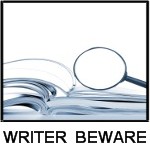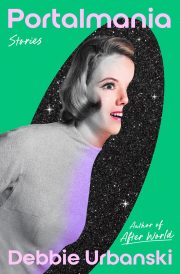Best Solution Author Agency (or, Beware of Agent Solicitations)
Posted by Victoria Strauss for Writer Beware
 I don’t often write posts like this, because it’s really like shooting fish in a barrel. And there are so many red flags here that savvy writers may wonder why I bother. But there are a lot of new writers searching for agents, many of whom are probably new to Writer Beware, and may not yet be clear on what to watch out for. I also think it’s important, every now and then, to emphasize the basics of author self-protection–because as cataclysmically as the publishing landscape is changing, the basic warning signs remain the same.
I don’t often write posts like this, because it’s really like shooting fish in a barrel. And there are so many red flags here that savvy writers may wonder why I bother. But there are a lot of new writers searching for agents, many of whom are probably new to Writer Beware, and may not yet be clear on what to watch out for. I also think it’s important, every now and then, to emphasize the basics of author self-protection–because as cataclysmically as the publishing landscape is changing, the basic warning signs remain the same.
Currently doing the rounds (at least, judging by the number of reports I’ve received) is this spam…er, solicitation from a new literary agency called Best Solution Author Agency (I’ve reproduced it exactly as written).
[Author’s Name Redacted]:
I found your profile on Writers.net and I would like to take a moment and introduce myself and my company My name is Dan Grogan and I am a Literary agent and co-owner of Best Solution Author Agency. At Best Solution we relieve authors of all the business worries, so that writers have the time to do what writers do best – WRITE.
We are interested in our authors long-term success. We provide the guidance for a writers career. Our authors benefit from our editorial experience in shaping their manuscripts/proposals before submitting them to publishers.
As public relation representatives, we concentrate on personal client attention. We have a persuasive team of consultants who will create the strategic media needed to get you exposure. Such as interviews, articles, book signings , reviews and many others.
Because our agents have long term relationships with particular publishers and editors we can sell a proposal faster than a writer can. Our familiarity with publishing companies enable us to target proposals to the most appropriate companies.
Our agents have experience as author consultants for major publishing and promotional companies. We know the path to take to promote and sell an authors work. We have connections in the film industry, publishing companies, and multi-media marketing companies, Our agents are well traveled and have attended many book shows and Hollywood pitch fests in the past. We are a growing company and take pride in promoting works of every genre.
We have no reading fee. When you are ready for us to take a look at your manuscript send us a one or two page summery and up to three chapters not exceeding 50 pages. We also offer a Critiquing Service for a small fee. Please see our website at http://best-solution.webs.com/ for submission details for either the manuscript or the Critiquing Service.
I have only a few openings on my client list and I am looking to fill those openings.
So let’s count the red flags, in ascending order of alarm.
– Cold-call solicitation. Reputable agents will sometimes directly approach an author whose work they’ve seen and liked (and if so, will reference that work). But they don’t rely on mass email solicitation to build their client lists.
– Multiple punctuation and spelling errors, both in the email and on the agency’s website (missing apostrophes, “summery” for “summary,” etc.). A literary agent should be able to write error-free English–and to proofread it once it’s written.
– Claims of experience that can’t be verified. There are more of these on the agency’s website. Alleging “long term relationships with particular publishers and editors” or “connections in the film industry, publishing companies, and multi-media marketing companies” are meaningless without specifics. A real agent with real experience who wants to tout that experience will say exactly what it is (see, for instance, the staff bios at the Nelson Literary Agency, or those at the Waxman Agency).
– Promotion of services irrelevant to literary representation. Reputable agents help guide their clients’ careers, but they don’t typically double as “public relation [sic] representatives.” And see this page of the agency’s website, where they claim, among other things, to be able to provide an ISBN, list clients’ books on Amazon, and “Copyright your work with the Nation [sic] Library of Congress.” These are services important for self-publishers, but not relevant to authors expecting their agents to sell their books to reputable trade publishers. (And wouldn’t you hope your agent would know that your work is copyrighted from the moment you write it down, and that what you do with the US Copyright Office–not with the Library of Congress–is register it?)
– A critiquing service for a fee. The publishing world is changing, and reputable agents are more and more branching out into other areas–including the provision of various paid services (I’m planning a post on that in the near future). However, offering a paid service to a potential client is a conflict of interest–never a good thing–and if you’re cold-call soliciting that client, it suggests that maybe shilling the paid service is your main objective.
– Possible fees for representation. From the FAQ on the agency’s website (my bolding):
Q. What will I have to pay for?
A. Each Author will have a package set up specifically for them. Fees vary based on what the author agrees to have us do to promote their work.
Do I need to say why this is a no-no? The only fee you should pay your agent is his or her commission when your book is sold.
– Agents with no verifiable professional background. Literary agenting is a skilled profession, and it’s very much dependent on connections. To be successful, agents need expertise in a variety of areas (such as a detailed knowledge of publishing contract language) and contacts within the publishing industry. Since there’s no formal training for literary agents, these skills and contacts are best acquired by actually working within publishing, or training at another (reputable) literary agency. Agents who set themselves up in business without that kind of background are at a really serious disadvantage. This is why, when you’re considering a new agent, you really, really want to make sure they have relevant professional experience.
Who are Best Solution’s staff? The agency’s website provides links to the Facebook pages of Dan Grogan and Karri Hilland, but there are no staff bios on the website (most reputable agents’ websites will not only name the agents, but provide some biographical information). Facebook is no help, since you can’t read Mr. Grogan’s or Ms. Hilland’s personal info unless you friend them. Googling doesn’t provide any joy, either. There’s absolutely no way to ascertain whether these two agents have any qualifications to run a literary agency (more about that below).
– No sales. There is no sign, on the agency’s website or anywhere else, of any book or script sales. For a new agency, that’s not surprising–it takes time to get up and running, and if the agent(s) have previous publishing or agenting experience, they’ve a reasonable chance of success. If the agents have no qualifications, however, success is much less likely, and sale-less now probably means sale-less later. (As a general rule of thumb, a new agency that’s going to be successful should start making sales within a year or so of starting up.)
There you have it. Red flags galore, from start to finish.
For the record, I don’t suspect that there’s bad intent behind Best Solution Author Agency. As with so many amateur agencies, its owners are probably sincere. Problem is, they just don’t have the knowledge or the expertise. In a completely unregulated, unlicensed industry, where there’s absolutely nothing preventing a totally unskilled person from advertising him- or herself as a literary agent, scams aren’t the only thing you need to watch out for.
(One last tidbit. Dan Grogan’s Facebook page lists his location as Bloomington, Indiana. Alert writers will recognize Bloomington as the home town of publishing services juggernaut Author Solutions, and also the birthplace of disgraced publishing service Airleaf (sued in 2008 by the Indiana Attorney General for violating Indiana’s Deceptive Consumer Sales Act) and its spawn, Jones Harvest Publishing (the subject of multiple author complaints).
Coincidence? It appears not. According to author advocate Bonnie Kaye (who was instrumental in making the Airleaf lawsuit happen), Dan Grogan is a former Jones Harvest employee who quit recently in distress over the company’s business practices. Kudos to Mr. Grogan for following his conscience–but working for a pay-to-play publishing service is not exactly the best preparation for a career as a literary agent [it may also explain the inappropriate self-publishing-style “services” the agency advertises]. Yet another sign that Best Solution Author Agency will probably not live up to its name.)


